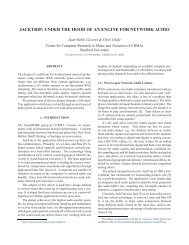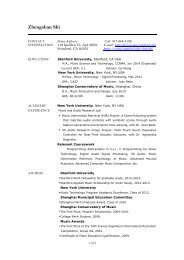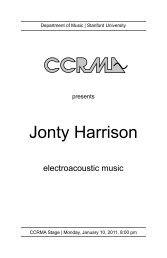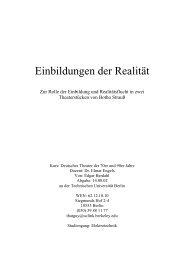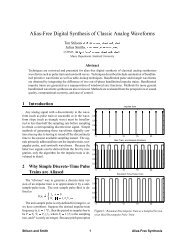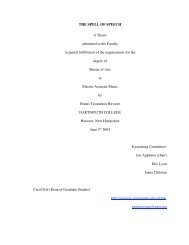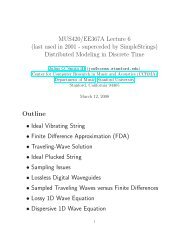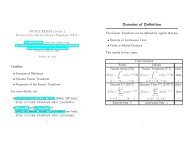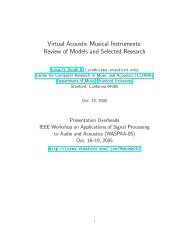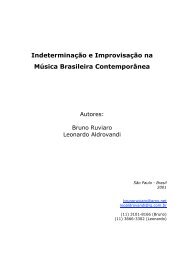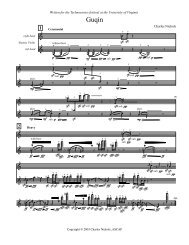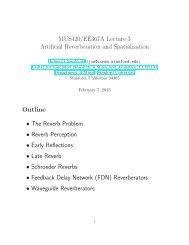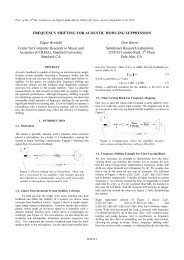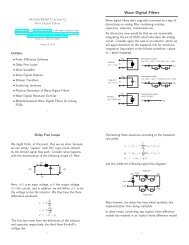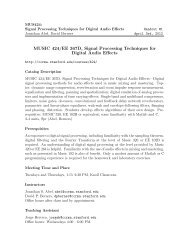Download - CCRMA - Stanford University
Download - CCRMA - Stanford University
Download - CCRMA - Stanford University
Create successful ePaper yourself
Turn your PDF publications into a flip-book with our unique Google optimized e-Paper software.
6 Research Activities<br />
Computer music is a multi-disciplinary field. The research summarized in this overview spans such<br />
areas as engineering, physics, computer science, psychology, and music [including performance, analysis,<br />
and composition) Any given research topic may require sophistication in several of these fields. This<br />
document can only contain a brief review of the work being done at <strong>CCRMA</strong>. For a more complete<br />
description of the research, a list of <strong>CCRMA</strong> research publications is included. Copies of reports are<br />
available upon request.<br />
The researchers working at <strong>CCRMA</strong> include graduate students, faculty, staff, and visiting scholars.<br />
Email may be sent to any of these people hy mailing to iogm@ccrma.stanford.edu where lotjin names<br />
are listed in the roster at the beginning of this publication.<br />
6.1 Computer Music Hardware and Software<br />
6.1.1 The <strong>CCRMA</strong> Music Kit and DSP Tools Distribution<br />
David Jaffe and Julius Smith<br />
New releases (V5.0 —) are now made by Leigh Smith of tomandandy and Stephen Brandon at the <strong>University</strong><br />
of Glasgow, who are porting the Music Kit to OPENSTEP. Apple's MacOsX and MacOsX-Server.<br />
Windows98. and Linux. Latest releases and progress can be found at http://www.tomandandy.com/-<br />
MusicKit.<br />
The 4.2 version of the Music Kit was released in 1997 and is available free of charge via FTP at<br />
ftp://ccrma-ftp.stanford.edu/pub/NeXT/MusicKit/. This release is compatible with NEXTSTEP<br />
software releases 3.2 and later on NeXT and Intel-based hardware. Also. Music Kit programs that are<br />
compiled under NEXTSTEP can run on OPENSTEP for Intel and NeXT hardware.<br />
Release 4.2 is an incremental release with several significant additions:<br />
• SUPPORT FOR TURTLE BEACH FIJI/PINNACLE DSP CARDS (INTEL-BASED HARD<br />
WARE)<br />
The 4.2 Music Kit includes a new driver and support for the Turtle Beacli Fiji and Pinnacle<br />
DSP cards. These cards provide the best price/performance of any currently-available Music Kitcompatible<br />
DSP cards (as of July 1997). They have a DSP56002. 32K of fast static RAM. and<br />
both digital and high-quality analog I/O. The Pinnacle also has an MPU401-compatible Kurzweil<br />
synthesizer that will work witli the Music Kit. MIDI driver. In addition, the Music Kit driver for<br />
the Turtle Beach Multisound. Tahiti and Monterrey has been upgraded to support the full Turtle<br />
Beach DSP memory space.<br />
• UPGRADED INTEL-BASED HARDWARE SUPPORT<br />
The Intel implementation has been optimized. Support for writing soundfiles from the DSP is now<br />
supported on Intel hardware. This functionality was previously available only on NeXT hardware.<br />
• MOST RECENT APPLICATIONS<br />
Two Music Kit applications of note are available separately:<br />
- Sequence, a Music Kit Sequencer developed by Pinnacle Research. The new Sequence 0.9.85<br />
release is available free from the <strong>CCRMA</strong> ftp server (ftp://ccrma-ftp.stanford.edu/pub/-<br />
NeXT/Sequence.9.85.tar.gzl. This is an updated version released in 1998.<br />
- Synth Builder, a synthesis instrument design and performance tool. SynthBuilder was the<br />
Grand Prize winner of the Second Annual International Music Software Competition at<br />
Bouiges. It was developed by <strong>Stanford</strong> <strong>University</strong>'s Sondius program, and is now being<br />
27



